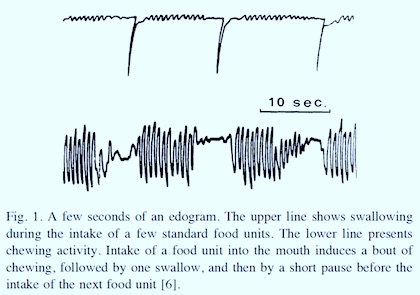Self-proclaimed experts, and the twists and turns of people chewing and swallowing — these are the things that turn up in this week’s Improbable Research podcast.
SUBSCRIBE on Play.it, iTunes, or Spotify to get a new episode every week, free.
This week, Marc Abrahams tells about:
- The impossible expertise of self-proclaimed experts. (The Dunning-Kruger Effect / “When Knowledge Knows No Bounds — Self-Perceived Expertise Predicts Claims of Impossible Knowledge,” Stav Atir, Emily Rosenzweig, David Dunning, Psychological Science, vol. 26 no. 8, 2015, pp. 1295-1303. /
 “Unskilled and Unaware of It: How Difficulties in Recognizing One’s Own Incompetence Lead to Inflated Self-Assessments,” David Dunning and Justin Kruger, Journal of Personality and Social Psychology, vol. 77, no. 6, December 1999, pp. 1121-34. Featuring dramatic readings by Robin Abrahams.)
“Unskilled and Unaware of It: How Difficulties in Recognizing One’s Own Incompetence Lead to Inflated Self-Assessments,” David Dunning and Justin Kruger, Journal of Personality and Social Psychology, vol. 77, no. 6, December 1999, pp. 1121-34. Featuring dramatic readings by Robin Abrahams.) - Chewing and swallowing research. (Bellisle, France, B. Guy-Grand, and J. Le Magnen (2000). ‘Chewing and Swallowing as Indices of the Stimulation to Eat During Meals in Humans: Effects Revealed by the Edogram Method and Video Recordings.’ Neuroscience and Biobehavioral Reviews 24 (2): 223–28. /
 Bellisle, France, and Anne-Marie Dalix (2001). ‘Cognitive Restraint Can Be Offset by Distraction, Leading to Increased Meal Intake in Women.’ American Journal of Clinical Nutrition 74 (2): 197–200. Featuring dramatic readings by Jean Berko Gleason.) Here’s detail from the “Chewing and swallowing” study:
Bellisle, France, and Anne-Marie Dalix (2001). ‘Cognitive Restraint Can Be Offset by Distraction, Leading to Increased Meal Intake in Women.’ American Journal of Clinical Nutrition 74 (2): 197–200. Featuring dramatic readings by Jean Berko Gleason.) Here’s detail from the “Chewing and swallowing” study: 
The mysterious John Schedler or the shadowy Bruce Petschek perhaps did the sound engineering this week.
The Improbable Research podcast is all about research that makes people LAUGH, then THINK — real research, about anything and everything, from everywhere —research that may be good or bad, important or trivial, valuable or worthless. CBS distributes it, on the CBS Play.it web site, and on iTunes and Spotify).